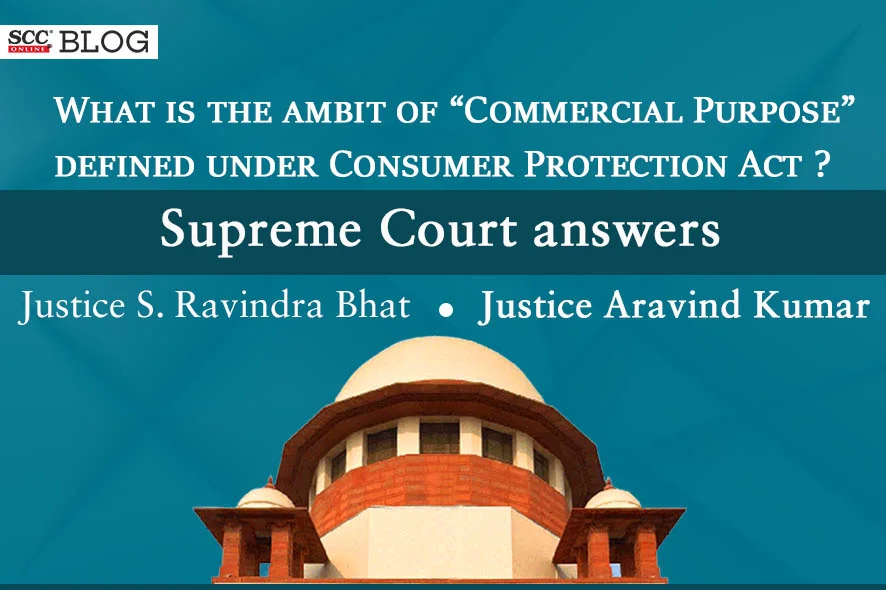Supreme Court: In an appeal against the order passed by the National Consumer Dispute Redressal Commission (‘NCDRC’), wherein the commission held that the commercial space booked by the complainants was for earning profit and not for the purpose of earning a livelihood by self-employment. Thus, the appellants are not consumers as defined under Section 2(1)(d) of the Act, the division bench of S. Ravindra Bhat and Aravind Kumar*, JJ. while setting aside the impugned order, said that the expression ‘for any commercial purpose’ must be understood as covering cases other than those of resale of the goods. The persons buying goods either for resale or for use in large-scale profit-making activity will not be consumers entitled to protection under the Act. However, if commercial use is by purchasers for earning livelihood by self-employment, they will be considered as consumers. Thus, it directed the respondent to refund a sum of Rs.51,10,117/- with interest at 12% per annum from the date of complaint till date of payment with litigation cost of Rs. 1 lakh to the appellant
The issue in this present case is the interpretation of the word and expression “Commercial Purpose” defined under Section 2(1)(d) of the Consumer Protection Act, 1986 (‘Act,1986’)
The Court noted that the NCDRC at the outset considered the question as to whether the appellants are “Consumer” and answered in the negative. It has been held that the appellants would not be entitled to seek redressal of their grievance under the provisions of the Act. The Commission has arrived at the conclusion that the complainant was running a dealership business of Reliance Industries for their livelihood, and they are also engaged in the business of investment in property. Hence, the commercial space booked by the complainants was for earning profit and not for the purpose of earning a livelihood by self-employment. Thus, the appellants are not consumers as defined under Section 2(1)(d) of the Act.
The Court noted that the expression “consumer” indicates that any person who buys any goods for consideration which has been paid or promised or partly paid and partly promised under any system of deferred payment and includes any user of such goods other than the person who buy such goods. Such goods for consideration paid or promised or partly paid or partly promised, or under any system of deferred payment, when such use is made with the approval of such person but does not include a person who obtains such goods or services for resale or for any commercial purpose. Thus, it said that the Parliament has excluded from the scope of ‘Consumer’ for igniting proceedings under the Act, a person who obtains goods or services for re-sale or for any commercial purpose.
The Court said that the expression ‘commercial purpose’ has not been defined under the Act. Thus, the words ‘for any commercial purpose’ must be understood as covering cases other than those of resale of the goods. Thus, persons buying goods either for resale or for use in large-scale profit-making activity will not be a consumer entitled to protection under the Act.
The Court, while going by the ordinary meaning of the expression ‘commercial purpose’, said that ‘Commercial’ denotes “pertaining to commerce”. However, the Explanation clarifies that even purchases in certain situations for ‘commercial purposes’ would not take within its sweep the purchaser out of the definition of expression ‘consumer’.
The Court relied on Lilavati Kirtilal Mehta Medical Trust v. Unique Shanti Developers, (2020) 2 SCC 265, wherein, it was held that a straight jacket formula cannot be adopted in every case and the broad principles which can be curled out for determining whether an activity or transaction is for a commercial purpose would depend on facts and circumstances of each case. The Court said that if the dominant purpose of purchasing the goods or services is for a profit motive, such purchaser would not fall within the four corners of the definition of ‘consumer’.
The Court noted that the appellants were in search of office space “for their self-employment and to run their business and earn their livelihood”. Further, it said that the statement of the appellant was that he engaged in the business of investment/dealing in property would not ipso facto suggest or indicate the property proposed to be purchased from the respondent was for commercial purposes. Thus, the Court held that the finding by the Commission in the impugned order is erroneous and contrary to the definition clause of the expression “consumer” as defined under section 2(1)(d).
[Rohit Chaudhary v. Vipul Ltd., 2023 SCC OnLine SC 1131 , decided on 06-09-2023]
*Judgment Authored by: Justice Aravind Kumar
Know Thy Judge | Supreme Court of India: Justice Aravind Kumar






